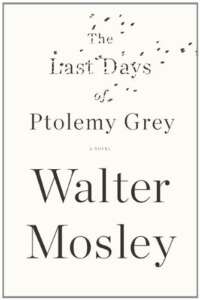 Discussion questions for The Last Days of Ptolemy Grey by Walter Mosley
Discussion questions for The Last Days of Ptolemy Grey by Walter Mosley
- When you finished the novel, did you go back and read the letter to Robyn at the beginning? Did it help you make sense of the story? Why do you think Mosely included the letter at the beginning instead of in its chronological place?
- Why do you think Ptolemy waited so long to do something with Coydog’s treasure?
- On p. 72, upon hearing of Reggie’s death, Ptolemy’s neighbor asks, “What are they doin’ to our young black men?” and Ptolemy replies, “Killin’ em… What they always done.” Did reading this book make you think about institutional or systemic racism?
- What did you think of Robyn? Were you suspicious of her motives at any time in the narrative? Did your thoughts about her change (for better or worse) as the story went on?
- In an interview with The Root, Mosley says that he didn’t intend to make a case for the mistreatment of the elderly, he says, “because that’s another way of victimizing them. If you start talking about any group as oppressed people, their identity becomes the identity of victims; that’s not very interesting. It’s more about a story, an adventure about his survival, than it is calling attention to the plight of the elderly. It’s more understanding — hopefully a deep understanding — of how [Ptolemy’s] mind is working and who he is in this world.” Does he succeed in this?
- Ptolemy accepts his Faustian bargain in part out of a sense that he has an obligation to Coydog McCann to discharge before he dies, if only he can remember what it is. But before he can let the medication take its final toll on him, he discharges another obligation, this one to Reggie to find out the truth of who killed him and avenge his murder. Ultimately, which responsibility do you think was more important to Ptolemy? Why?
- In several reviews, Dr. Rubin and described as “unscrupulous” (AARP Magazine), “rather shady” (Bookreporter.com), or the like. Do you agree?
- What did you think about the TV and radio always being on in Ptolemy’s apartment? Do you think Mosley was trying to comment on the ubiquitousness of media in today’s society and how it affects the way we think (even without dementia)?

